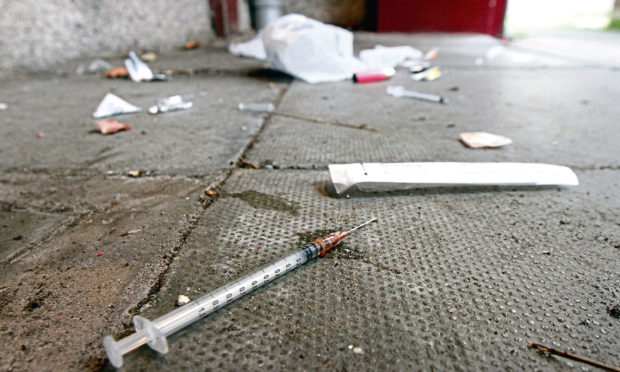Sometime in the early 1990s, Scotland’s heroin overdoses passed the 100 mark. The nation was horrified.
Concerned social workers, advocacy groups and politicians all agreed it was a tragedy.
“There’s a lot of hard work and effort going into reducing this, but the numbers continue to rise. We need to look carefully at what we are doing and do things differently,” said Dave Barrie, who could have been one of them – he looks the same, issues the same warnings and works in the field of addiction.
Yet Barrie works now, not 30 years ago. Through no fault of his own, Barrie, of Dundee’s Addaction, is a kind of everyman figure, a constant in Scottish public life.
Just like the chairwoman of the Tayside Drug Death Review Group and Consultant in Public Health Medicine, Dr Emma Fletcher, who said: “The majority of drug deaths occur in people who have experienced considerable life adversity, often from a young age. Problematic drug use is rarely an independent choice by an individual, but the result of complex social, economic and health factors.”
Calling for drug reform is just a part of the scenery of Scottish politics.
This year, the number of deaths from all prescribed drugs will be close to 1,000.
Heroin is no longer the main scourge – opioids are.
Alcohol-related deaths are about 1,200 per year.
In a culture that celebrates alcohol but criminalises drug use, it is astonishing that fatalities from both are only slightly different.
Our drug deaths are the highest per capita in Europe.
I once dubbed this the “Scottish suicide”. That was wrong. Suicide implies choice.
The drink and drug addicts had their free will curtailed by psychological or social harm.
Stopping is incredibly hard – and relapsing very easy.
Westminster’s Scottish Affairs Committee is yet again looking into the drug problem and heard evidence this week from Dr John Budd, who said: “Childhood poverty is a major driver in terms of long-term health outcomes.”
An unscientific guess is that drug deaths are higher today because we failed to fix this in the past.
As noted previously, we are good at being concerned by this.
Two months ago, John Finnie, the co-convener of Holyrood’s cross-party group on drug and alcohol misuse, asked the first minister about the reported increasing number of drug deaths.
Nicola Sturgeon responded with the new national alcohol and drug strategy.
Finnie replied: “The current approach clearly is not working, first minister. There were 934 drug-related deaths in 2017 and, sadly, everything suggests that the figure for 2018 may be significantly higher.”
We are facing a public health crisis. Finnie, and many others, want a public inquiry into drug deaths.
Sturgeon doesn’t. She said: “I absolutely agree about the seriousness of the issue. I am not immediately persuaded that a public inquiry would be the best way forward.
“We want to look at different ways of addressing the issues. For example, we have supported Glasgow City Council in its request to set up medically supervised safer-consumption facilities.”
Both are examples of the “stair” argument that dominates much of Scottish political discourse.
The opposition shouts at the SNP across the stair to do something (a public inquiry).
The SNP go down the stair to complain that the UK/England is not doing its share. Doors are slammed. Silence follows.
The SNP have fixed on drug-use rooms as a solution, but the UK/England, in control of drug policy, have said no. So the neighbours blame each other.
The truth is lost in the fury. Would drug-use rooms make much of a difference? It’s very hard to tell.
In one year, 145 people died in road deaths.
In comparison, six times as many people die from drugs as do on our roads each year.
Since 2001, 454 British soldiers have died in Afghanistan.
Compared with Afghanistan, since 2001, roughly 15,000 people have died from drugs in Scotland.
The greatest tragedy here is that the journey of political outrage to official report to inquiry to strategy and finally action is one of diminishing effect – anger gives way to “Will this do?”.
We are literally breeding people to fail, and then allowing them to do so.
To paraphrase: Show me your drugs policy and I will show you your decency.
Scotland is incapable of separating a policy solution for the folk of deprived parts of Dundee from the concerns of Broughty Ferry.
Concern is parsed by the political realities of what will the voting middle classes think.
So we are either all children, or all treated as adults – when of course, we need real action for poor kids, and the guts to tell the rest of us to accept it.
Much of Scottish exceptionalism in health policy comes down to the appalling suffering of a few.
We must take action – for the sake of those neglected children, those harmed individuals. Lives that never had a chance to blossom.
This is not just a drugs problem – it is a problem about the morality of a country that allows a minority to suffer, generation after generation.
Our drug fatalities are an indictment of all of us.
We have failed our humanity.



